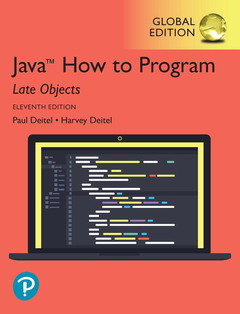Java How to Program, Late Objects, Global Edition (11th Ed.)
Auteurs : Deitel Paul, Deitel Harvey

The Deitels' groundbreaking How to Program series offers unparalleled breadth and depth of programming fundamentals, object-oriented programming concepts and intermediate-level topics for further study.
Java How to Program, Late Objects, 11th Edition, presents leading-edge computing technologies using the Deitel signature live-code approach, which demonstrates concepts in hundreds of complete working programs. The 11th Edition presents updated coverage of Java SE 8 and new Java SE 9 capabilities, including JShell, the Java Module System, and other key Java 9 topics.
1. Introduction to Computers, the Internet and Java
2. Introduction to Java Applications; Input/Output and Operators
3. Control Statements: Part 1; Assignment, ++ and -- Operators
4. Control Statements: Part 2; Logical Operators
5. Methods
6. Arrays and ArrayLists
7. Introduction to Classes and Objects
8. Classes and Objects: A Deeper Look
9. Object-Oriented Programming: Inheritance
10. Object-Oriented Programming: Polymorphism and Interfaces
11. Exception Handling: A Deeper Look
12. JavaFX Graphical User Interfaces: Part 1
13. JavaFX GUI: Part 2
14. Strings, Characters, and Regular Expressions
15. Files, Input/Output Streams, NIO and XML Serialization
16. Generic Collections
17. Lambdas and Streams
18. Recursion
19. Searching, Sorting and Big O
20. Generic Classes and Methods: A Deeper Look
21. Custom Generic Data Structures
22. JavaFX Graphics and Multimedia
23. Concurrency
24. Accessing Databases with JDBC
25. Introduction to JShell: Java 9’s REPL
Chapters on the Web
A. Operator Precedence Chart
B. ASCII Character Set
C. Keywords and Reserved Words
D. Primitive Types
E. Using the Debugger
Appendices on the Web
Index
Online Chapters and Appendices
26. Swing GUI Components: Part 1
27. Graphics and Java 2D
28. Networking
29. Java Persistence API (JPA)
30. JavaServer™ Faces Web Apps: Part 1
31. JavaServer™ Faces Web Apps: Part 2
32. REST-Based Web Services
33. (Optional) ATM Case Study, Part 1: Object-Oriented Design with the UML
34. (Optional) ATM Case Study, Part 2: Implementing an Object-Oriented Design
35. Swing GUI Components: Part 2
36. Java Module System and Other Java 9 Features
F. Using the Java API Documentation
G. Creating Documentation with javadoc
H. Unicode®
I. Formatted Output
J. Number Systems
K. Bit Manipulation
L. Labeled break and continue Statements
M. UML 2: Additional Diagram Types
N. Design Patterns
· Rich coverage of programming fundamentals; real-world examples.
· Friendly late classes and objects presentation.
· Use easily with JavaTM SE 8 and/or the new JavaTM SE 9.
o Java SE 9 content is in easy-to-include-or-omit sections.
o Perfect for instructors who want to stay in Java SE 8 for a while and ease into Java SE 9.
o Perfect for instructors who want to add JShell (Java 9’s interactive Java) to their Java SE 8 or Java SE 9 courses.
· Signature live-code approach teaches programming by presenting the concepts in the context of complete working programs.
· The text’s modular organization is appropriate for introductory and intermediate programming courses, and helps instructors plan their syllabi.
· Comprehensive coverage of concepts and topics:
o Interactive Java through JShell–Java SE 9’s most exciting new pedagogic feature.
o Java 9 topics: Modularity (online), collection factory methods and other language and API enhancements.
o Lambdas, sequential and parallel streams, functional interfaces, immutability.
o JavaFX GUI, 2D and 3D graphics, animation and video.
o Composition vs. Inheritance, dynamic composition.
o Programming to an interface not an implementation.
o Files, input/output streams and XML serialization.
o Concurrency for optimal multi-core performance.
o Other topics: recursion, searching, sorting, generics, generic collections, data structures, optional Swing GUI, multithreading, database (JDBC TM and JPA), web-app development, REST-based web services.
· Access to the Companion Website (http://www.pearsonglobaleditions.com) is available with the purchase of a new textbook and provides extra hands-on experience and study aids, includi
Date de parution : 09-2019
Ouvrage de 1248 p.
17.8x23.1 cm



